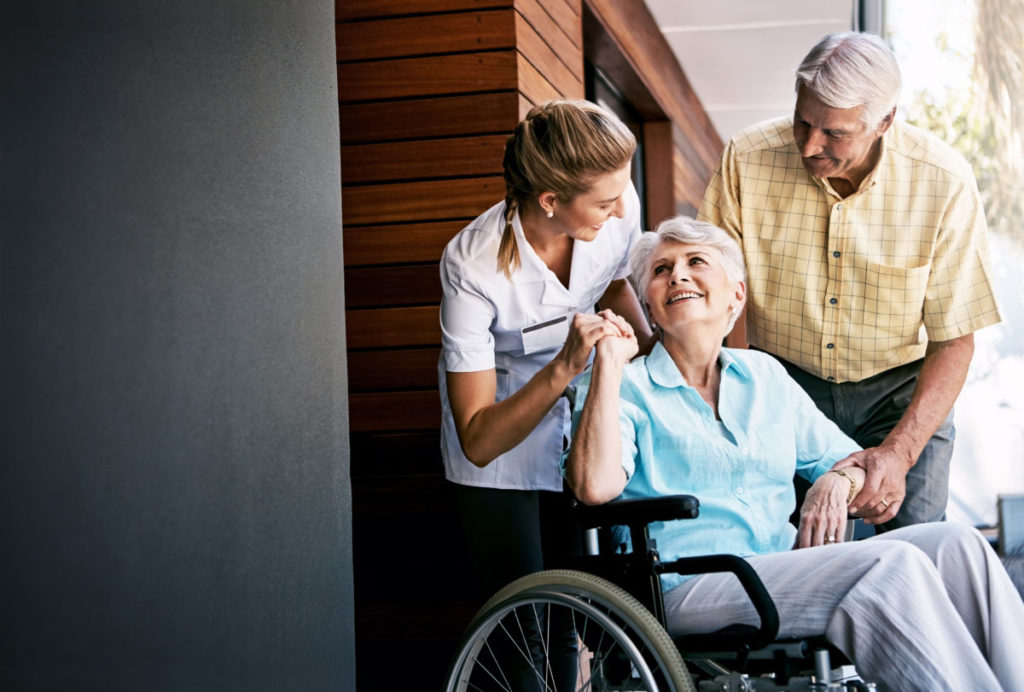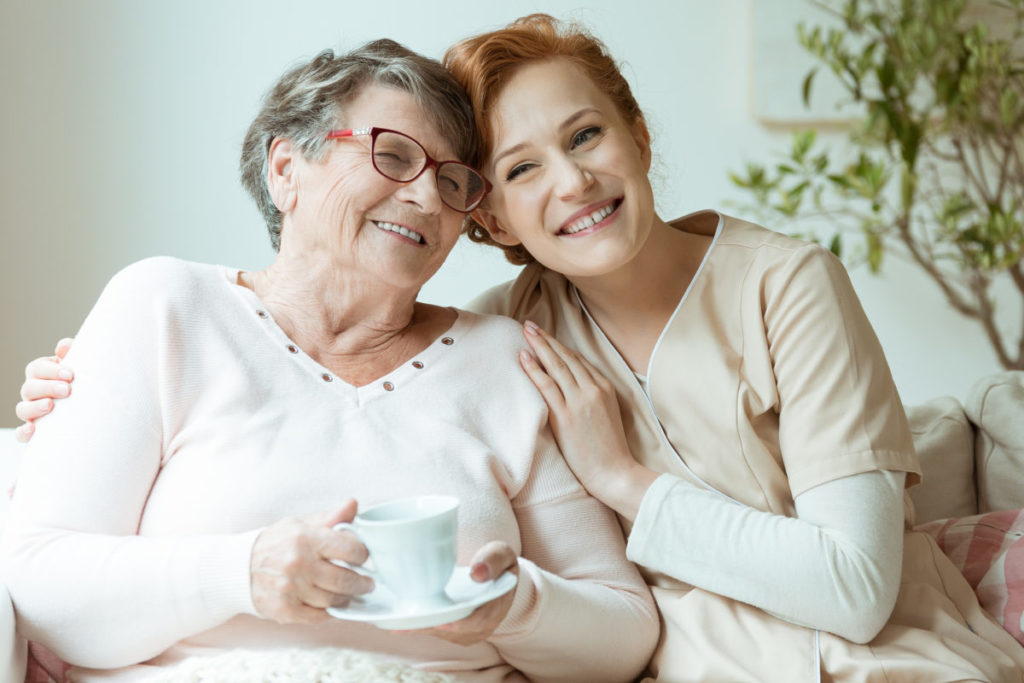As a caregiver, you have to practice on a daily basis, the act of putting other patient’s needs above yours to ensure health and well-being. When you couple this with the fact that you are making someone else’s life easier and better, caregiving can be incredibly rewarding.
Care giving is a demanding role that more people are taking on. The Family Caregiver Alliance reported that more than 65 million Americans provide unpaid care to a relative, a neighbor, or a friend. Becoming a skilled caregiver takes a lot of practice. A skilled caregiver will learn and understand how to control the spread of disease, how to make the senior feel happy through social-emotional development, how to manage the child-like behavior of some seniors, how to care for them when sick and how to manage time effectively.
65,000,000 Americans provide unpaid care to a relative, neighbor, or friend
Through ongoing caregiver assessment and in-home care, you need to know that communication is the most vital part of effective care. If you communicate well with the senior patient you are providing help, there is a great chance that you will provide a good care that will keep the senior happy always and ensure the best possible health and well-being.
Give Your Loved Ones The Best Care
Caring for parents as they age is never easy. The help from home care services allows you to maintain your relationship while providing the best care possible.

No matter the amount of needs and dependence and/or independence level of the senior, a caregiver is expected to be skilled at meeting those needs or long-term care.
Effective communication can also help the senior live longer and better. Most people have to work to be a skilled communicator. Communication isn’t the only skill a caregiver must have. There are others. However, effective communication can be said to be the cornerstone of caregiving. The most important caregiver skills that seniors really appreciate are those that go beyond technical competence but focus on social competence. Below, are the caregiver skills that help seniors achieve optimal health status and stay happy.
Effective Communication Skills

Caregivers are instrumental to the health of seniors. Being able to communicate well is key to how instrumental a caregiver is. It could be as simple as doing the daily routine activities to keep the senior in good health. It could also be as difficult as talking about health concerns, knowing when it’s time for a medical checkup even when the senior isn’t making any mention of such.
Listening is an important communication skill that is highly encouraged. Additionally, talking effectively might be time consuming, but if you learn the art of talking concisely, you will reap many benefits.
Poor communication will do neither the caregiver nor the senior any good. It could even damage the relationship, especially if the senior is a family member or a neighbor. Also, there are cases where the senior has more than one caregiver. In such circumstances, it is important for the caregivers to pass information across to one another. Whether it is as minute as kitchen needs or major issues such as health, caregivers have to communicate with one another and with the appropriate persons.
Listening is an important communication skill that is highly encouraged. Don’t just take decisions on your own without asking and listening to the recipient of your decision. You have to pay attention to what the senior utters and do rightly so. Sometimes, the focus isn’t even on what they need. It is much more about knowing that someone is ready and open to listen to what they have to say. So, you have to be skilled at listening.
Talking effectively might be time taking, but if you learn the art of talking concisely, you will reap many benefits. Don’t assume that you have to yell at them because they are now very old. Yelling will always have a negative result. They are humans and can feel every word spoken to them. Rather than yelling, focus on speaking more effectively. If you can give your words in very simple and concise words, you will come into the home of a happy senior every day. Other times, you might have to talk more slowly and with less noise while using more words. That’s how skilled you have to be when it comes to taking care of seniors.
Empathy

Devoting your time to provide care and support for someone is one of the best things in the world. It is the most selfless act that anyone can do. You have already taken the right step to take care of the senior. Now, it’s time to move a step further. You have to be skilled at showing empathy toward the senior you are caring for.
Empathy gives you a perspective of trying to fit yourself in the other person’s shoes. Being empathetic will increase the quality of care and the amount of time you provide.
Knowing the challenges and limitations of the person you are caring for will make things easier for them and improve your relationship with them. Empathy goes a long way in doing that. Empathy gives you a perspective of trying to fit yourself in the other person’s shoes. Being empathetic will increase the quality of care and the amount of time you provide. This will, in turn, improve the quality of life of the senior.
Give Your Loved Ones The Best Care
Caring for parents as they age is never easy. The help from home care services allows you to maintain your relationship while providing the best care possible.
Patience

Patience while caregiving means you have to slow down and rethink what you are doing at the present moment. It means you have to think about the best way to communicate with a senior without being condescending.
Patience is one of the best skills anyone can have, regardless of their occupation.
Putting yourself as the second on your priority list is unnatural. However, your job as a caregiver requires that you have to be skilled at putting yourself second.
Positivity

Just like any job, approaching caregiving with positivity makes it easier. If you are not a naturally optimistic kind of person, you might have to be well-skilled in this area. Positivity makes a lot difference for you and the senior. Your positivity may rub off on the older person and they might start become very happy whenever you arrive.
Positivity makes a lot difference for you and the senior. If your focus is to keep a senior happy—this is one skill you really have to be good at.
When you are happy and optimistic, the quality of care you will provide will be way better than the care you will provide when you are feeling unhappy or grumpy. Everyone’s lives will be made better when everyone inculcates a positive attitude.
Keen Observation Skills

The caregiver is required to be skilled at observing. This means that you should be able to spot when she needs medical care, when she needs to tell you something but feels reluctant, and when she just wants her alone time. You need to be able to spot when something is going wrong and report such observations to the appropriate person.
Give Your Loved Ones The Best Care
Caring for parents as they age is never easy. The help from home care services allows you to maintain your relationship while providing the best care possible.
Body Language Skills

Body language is both a mix of communication and observation. If you are good at effective communication and keen observation skills, you will undoubtedly understand a person’s body language. Whether you are talking or listening to a senior, you must be able to pay detailed attention to body language. Many times, seniors won’t have to utter a word. You just have to get a clue of what they really need at that particular time.
Body language is both a mix of communication and observation. As a caregiver, you have to be skilled when you are both active and passive.
As a caregiver, you have to be skilled when you are both active and passive. More so, the senior you are caring for might have speech impairment which means they are unable to communicate as freely as they would want. How do you solve this? How do you provide maximum support for them even with such issues? It is your ability to read body language that will be your only tool.
Conclusion
Being a caregiver can be rewarding knowing that you have provided help and support for someone who isn’t able to do that all by themselves. Caregivers need to make life easier, better, happier, and more fun for seniors. Consistently putting the aforementioned skills in your mind will make you much more effective when caring for seniors. As a caregiver, you play the role of helping a senior with multiple tasks. You have to be able to communicate with seniors if you want to help them live better lives. Communication is vital if you aim to ensure that the senior receives the best care.
Do you want to cite this page? Use our ready-made cite template.
